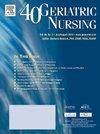预测日本住院老年人在护肤过程中因机械刺激引起的皮肤屏障功能障碍的提名图。
IF 2.5
3区 医学
Q3 GERIATRICS & GERONTOLOGY
引用次数: 0
摘要
护肤过程中的机械刺激有可能导致老年患者皮肤屏障功能失调。因此,在护肤前需要进行充分的皮肤评估;然而,目前尚无有效的评估方法。本研究利用随机对照试验数据集的一个子集,开发了一种提名图,用于预测日本老年患者在护肤过程中因机械刺激引起的皮肤屏障功能障碍。149名老年患者(≥65岁)的前臂进行了机械刺激测试。皮肤屏障功能障碍是根据测试前后经表皮失水情况来定义的。候选变量来自医疗记录和皮肤评估。我们发现,26.2% 的老年患者存在皮肤屏障功能障碍。由慢性肾病、紫癜、皮肤干燥、日常生活活动和体重指数组成的提名图显示了令人满意的辨别力、校准和临床实用性。该工具是一种创新的、经过验证的皮肤评估方法,具有预防皮肤疾病和提供量身定制的优质护肤品的潜力。本文章由计算机程序翻译,如有差异,请以英文原文为准。
A nomogram to predict skin barrier dysfunction induced by mechanical irritation during skincare in hospitalized Japanese older adults
Mechanical irritation during skincare poses a risk of causing skin barrier dysfunction in older patients. Adequate skin assessment is thus required before skincare; however, no validated assessment method exists. This study developed a nomogram to predict skin barrier dysfunction induced by mechanical irritation during skincare in Japanese older patients using a subset of a randomized controlled trial dataset. The volar forearms of 149 older patients (≥65 years) underwent a mechanical irritation test. Skin barrier dysfunction was defined based on transepidermal water loss before and after the test. Candidate variables were obtained from medical records and skin assessments. We found that 26.2 % of older patients experienced skin barrier dysfunction. The nomogram, comprising chronic kidney disease, purpura, dry skin, activities of daily living, and body mass index, demonstrated satisfactory discrimination, calibration, and clinical utility. This tool serves as an innovative and validated method for skin assessment, offering the potential to prevent skin disorders and deliver tailored, high-quality skincare.
求助全文
通过发布文献求助,成功后即可免费获取论文全文。
去求助
来源期刊

Geriatric Nursing
医学-护理
CiteScore
3.80
自引率
7.40%
发文量
257
审稿时长
>12 weeks
期刊介绍:
Geriatric Nursing is a comprehensive source for clinical information and management advice relating to the care of older adults. The journal''s peer-reviewed articles report the latest developments in the management of acute and chronic disorders and provide practical advice on care of older adults across the long term continuum. Geriatric Nursing addresses current issues related to drugs, advance directives, staff development and management, legal issues, client and caregiver education, infection control, and other topics. The journal is written specifically for nurses and nurse practitioners who work with older adults in any care setting.
 求助内容:
求助内容: 应助结果提醒方式:
应助结果提醒方式:


